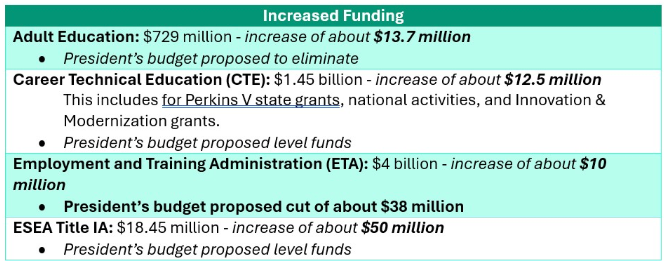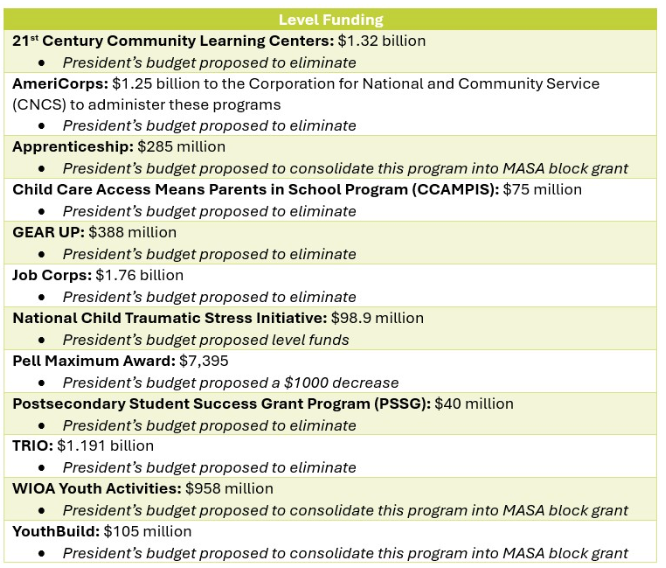The Senate Labor-HHS Funding Bill Preserves OY Funding, But Doesn’t Address the Biggest Threats
by Thomas Showalter
On July 31, the Senate Appropriations Committee approved, in a bipartisan vote, a Labor-HHS (LHHS) funding bill for fiscal year 2026. The LHHS bill funds programs operated by the Departments of Education, Health and Human Services, and Labor, as well as other, smaller agencies like the Corporation for National and Community Service (CNCS).
For advocates, the takeaway from the Senate bill is that Senate appropriators have rejected President Trump’s biggest proposed cuts and consolidations, but have not made a strong stand against what are expected to be significant cuts in the House bill.
In terms of funding levels, at the Department of Labor the Senate maintains level funding for the WIOA Youth and Dislocated Worker formula programs; YouthBuild; apprenticeship; and, in a major rebuke to the Trump Administration, Job Corps. The Reentry Employment Opportunities program would be cut by $5 million.
At the Department of Education, adult education grants – which the President’s Budget Request (PBR) proposed to eliminate – would see increases over the fiscal year 2025 (FY25) level. Perkins Career and Technical Education State Grants would also see an increase.
The Senate bill even level-funds AmeriCorps State and National Grants in the face of the Administration’s attempted dismantling of AmeriCorps. In report language – the detailed recommendations that accompany appropriations bills – Senate appropriators respond recent to Administration actions: They include new requirements for the Corporation for National and Community Service (CNCS) to make competitive grant awards in a timely fashion and to make monthly reports to Congress on the staffing levels supporting different agency programs.
The following tables contain information about these and other funding levels in the Senate bill, compared to current FY25 levels.
Perhaps most importantly, the LHHS statutory and report includes no language along the lines of the Make America Skilled Again (MASA) block-granting and consolidation scheme proposed in President Trump’s budget. Instead, the Senate’s workforce-development language largely mirrors the last time the Senate passed a complete LHHS bill, in fiscal year 2024.
The Senate bill also includes Congressionally Directed Spending (the Senate name for earmarks), to the tune of $94 million for projects related to DOL’s Employment and Training Administration. A quick scan reveals no projects that would directly benefit Opportunity Youth or out-of-school youth.
However, the Senate bill ignores the elephant in the room: Even if Congress passes funding at these levels, there’s no guarantee that the Trump Administration will spend money as Congress directs. The Administration continues to illegally withhold Congressionally appropriated AmeriCorps funding, and attempted to shut down most Job Corps centers.
The chair and ranking member of the Senate Appropriations Committee, Sen. Susan Collins (R-ME) and Sen. Patty Murray (D-WA), respectively, have promoted their attempts to insert guardrails into the bills. But most of these are notification requirements similar to those already in effect – and being regularly violated by the Trump Administration. For example, the fiscal year 2024 LHHS bill - whose provisions are still operative throughout FY25 as a result of the year-long continuing resolution - contained requirements for Congressional consultation and notification before an agency “reorganizes or renames offices” or “eliminates a program, project, or activity”; the Trump Administration has regularly violated these requirements.
The Senate bill also does not include language to defend Congress’s power of the purse against novel intrusions by the executive branch. These include pocket rescissions, a purported presidential power to disappear funds at the end of fiscal years promoted by Director of the Office of Management and Budget Ross Vought. The Government Accountability Office has found pocket rescissions illegal.
Now the fight turns to the House of Representatives. The LHHS Appropriations Subcommittee may mark up a bill as soon as next week, their first week back after the August recess. House funding levels are expected to be lower, may include elements of the MASA proposal, and may not include some of the limited guardrails included in the Senate bill.
You can defend funding for Opportunity Youth programs by organizing In-District Meetings with your Congressional delegation, using our resources.
RYC will be organizing meetings with Congressional offices throughout September as appropriations season continues.
Thomas Showalter is an independent consultant assisting nonprofits with policy change, program implementation, fund development, and communications, as well as a subject matter expert in areas including K-12 education, workforce development, and disability. Thomas was previously executive director of the National Youth Employment Coalition, served on the staff of the U.S. Senate Health, Education, Labor, and Pensions Committee, and worked in various roles at public-affairs and public-relations firms.




